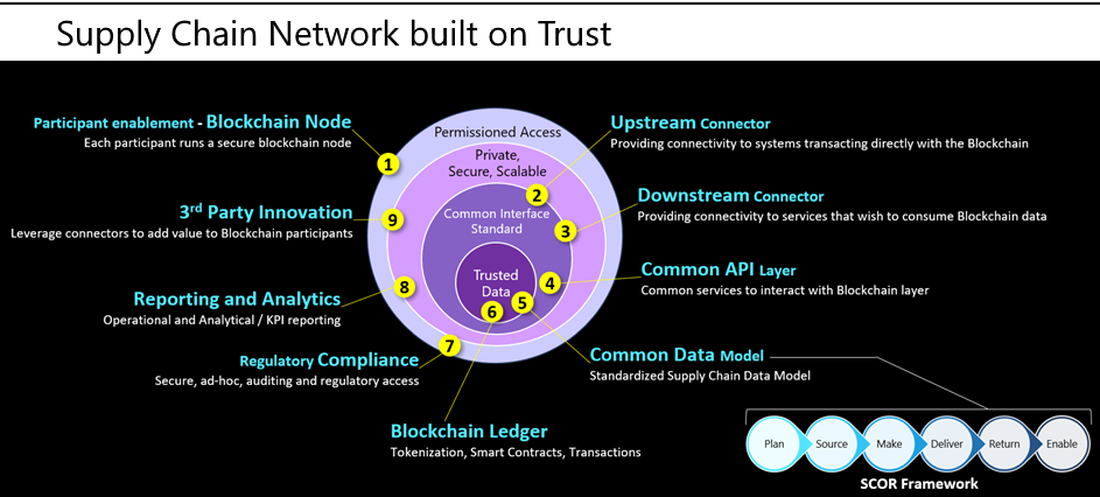Supply Chain Blockchain Initiative
Blockchain-based smart contracts to drive down Microsoft's supply chain costs and increase trust

"By adding more accountability to the ‘wild west’ that is the global supply chain, the Supply Chain Blockchain Initiative creates more efficiencies that add value, transparency, and speed to everybody in the supply chain. Makes it faster, more reliable, more profitable."
About Supply Chain Blockchain Initiative
Key Features: Enable E2E visibility and traceability of supply chain by providing Verifiable Data, Decentralized Trust, and Connected Processes.
- Blockchain solution that brings all supply chain participants together into an industry-based network
- Powered by Microsoft Azure Cloud with blockchain technology, the Supply Chain Blockchain Initiative creates a Smart Contract Consortium of participating organizations and suppliers
- Smart Contracts are stored in the blockchain system of record that is tamper-proof, and contracts are executed automatically when conditions are met
- Manufacturers and suppliers from upstream and downstream can accurately track the status of goods/transactions at each stage of the supply chain, solving lack of visibility issues and delays
- Smart contracts drive down costs for buyers and suppliers since issues are quickly identified and solved due to increased control and auditability all along the supply chain
- Increase trust with industry buyers on the quality of products and quality of partners, since the blockchain ledger provides a verifiable record of business
- Create a robust supply chain ecosystem with digitized transactions, financial integrity, and trusted data
- Bring together three workflows – physical, transactional and financial – for an accurate, full picture view of assets and parties involved in the supply chain from raw material to end-of-life
- Scale to any number of participating organizations, especially for complex, multi-tiered structures of suppliers or vendors
- Integration with IoT devices to track and tokenize inventory
- Enables predictive planning and strategic sourcing, optimizing asset management with a clear chain of custody and tighter security
Journey
When Yajing Liu, Senior Program Manager, heard about the Microsoft Global Hackathon in 2019, she wondered if it was possible to use this hacking opportunity to solve long-standing issues she had witnessed while working in the manufacturing industry with suppliers worldwide.
Suppliers, especially small-to-medium businesses, would sometimes experience issues related to interruption in business flow due to lack of visibility into deliverable status since many different parties were involved in handling the physical assets along the supply chain. Independent workflows of physical, transactional, and financial were managed in separate systems, which introduced challenges in accessing accurate, timely data needed for the supply chain to function efficiently. Yajing’s project idea for Hackathon was to use the blockchain to help tokenize assets and secure transactions across a shared immutable ledger, binding purchase order, price, production, genealogy, and chain of custody to the asset from beginning to end-of-life.
“I have been deeply involved working with suppliers worldwide for successful delivery of several high-volume products in the past few years,” says Yajing. “I started realizing how critical it is for enterprises, especially those who handle tens-of-thousands of transactions every day with a large network of supply chain partners, to be able to have end to end visibility of their supply chain, in order to adapt and run their business.”
Traditionally, each party has a narrow view of the asset or payment status pertaining to their level or tier in the supply chain. These siloed data lakes inherently lack transparency and contribute to an inaccessible system. “I thought we had an ethical responsibility to create a more resilient and trusted supply chain ecosystem,” Yajing explains as the guiding principle of her Hackathon 2019 project.
Tens-of-thousands of employees participate worldwide in the Microsoft Global Hackathon, so it was the perfect opportunity to get together with fellow employees to examine supply chain issues and prototype a potential solution to help.
 Layered model of a supply chain blockchain built on trust
Layered model of a supply chain blockchain built on trust
Blockchain was already mainstream in 2019 and the decentralized and immutable nature of blockchain algorithms makes the trade of goods/services for payment a fair and level playing field. Yajing saw the need for a distributed system that could be shared and trusted as a single source of truth across supply chain partners. That was why it made sense to center a new way of managing the supply chain business around blockchain technology, eliminating uncontrolled variables and uncertainties created by human factors and reconciling of individual records. Smart Contracts provide a clear and accurate record of all goods and transactions, and payment can be made in a timely manner with automated execution of the contract once conditions are met. A combination of verifiable data, decentralized trust, and connected processes helps enable strategic sourcing compliant to regulations, optimize commodity management and forecasting, and facilitate payment settlement across tiers of suppliers.
Yajing’s project won the Industry Executive Challenge in the 2019 Hackathon and the prize was to meet with leaders like EVP Judson Althoff, to show the prototype and the values of increasing trust with manufacturing partners.
Though the team has morphed over the years since the initial hack, Yajing remained tenacious in her pursuit of making it a reality. Bill Lin, Principal Software Engineer and Nick Miao, Principal Product Manager, were co-founders of the project and played an instrumental role during the Hackathon. “They continue to be involved as advisors after the Hackathon. Leaders like their CVP, Qi Zhang have been a mentor to the project and to myself till today,” says Yajing. “I hope this showcases to future hackers that hacking doesn’t stop at the end of the Hackathon week – it’s the beginning.”
Groups within the company saw the potential, like Ed Essey, Director in the Microsoft Garage, who coached Yajing through landing different sponsors, finding funding, and navigating relationships across organizations throughout the years following the Hackathon. Key contributors helped move the project forward including the internal company Incubation Studio, Yorke Rhodes, Director, Jodi Larson, GM, and CVP, Cliff Henson’s org as an angel investor, EVP Judson Althoff’s field team as an initial sponsor supporting the project on the customer journey along the way, the D365 group for their partnership, Devices Sourcing as another 1P customer, Rick Vingerelli, GM in Devices, as an angel sponsor and mentor to the project from its early Hackathon days, and Rolf Harms, CVP and his team who helped build the strategy and business planning from 2020 and onwards. Having formed these important connections, Yajing and her team ran trials with groups in Microsoft and built a strategic business plan.
Over the past few years, it became clear how easily supply chain processes can be disrupted by pandemic, trade conflicts, geopolitical tensions, and environmental challenges. There is a need for greater visibility and traceability in even the most advanced supply chain management systems and operations.
“Yajing has been the inspiration and the drive behind this project. Her vision has become a reality with our blockchain live within our Cloud Supply Chain, enabling billions of dollars of transactions per year,” says Jodi Larson. “Her work with external supply chains shows the value to the broader industry. Yajing’s fearless approach to making her vision a reality has been an inspiration.”
Team

(Pictured) Yajing Liu, Kevin Wilson, Yorke Rhodes III, Randy Ramig, Jasper Lee, Damian Patterson, Luis Naranjo Gomez, Anantha Natarajan, Jim Luo
